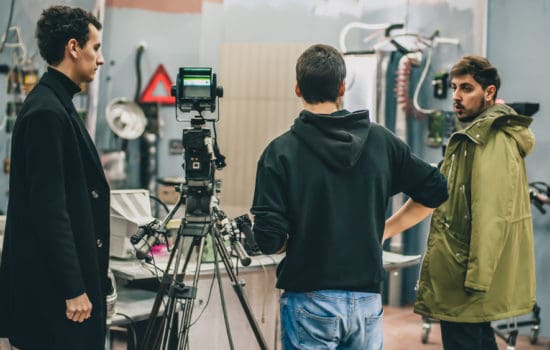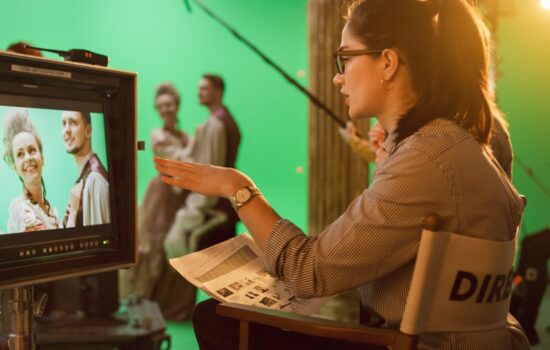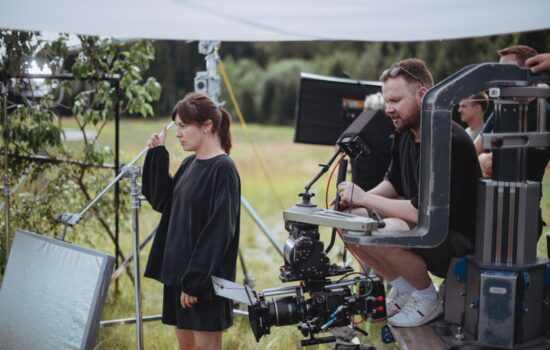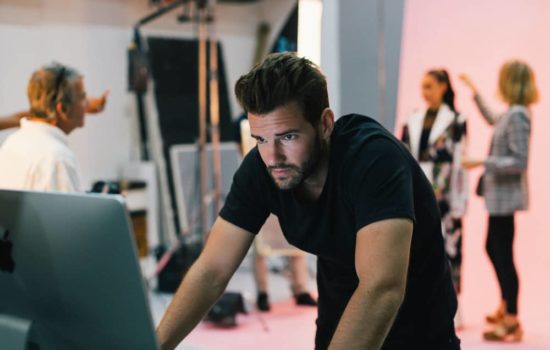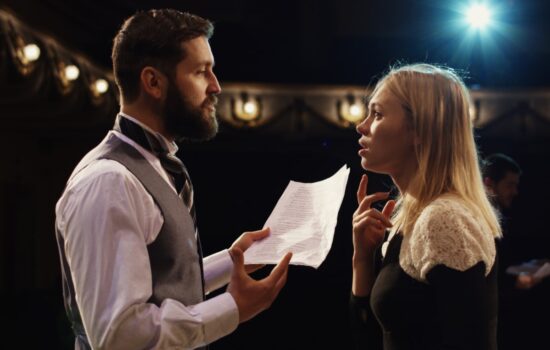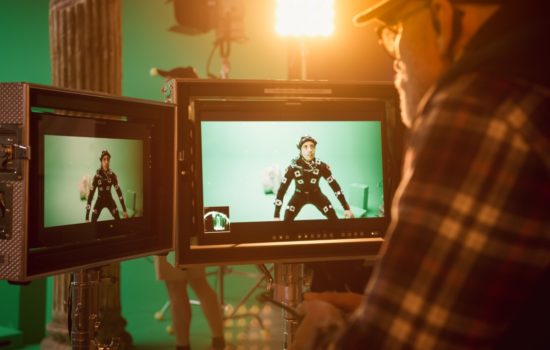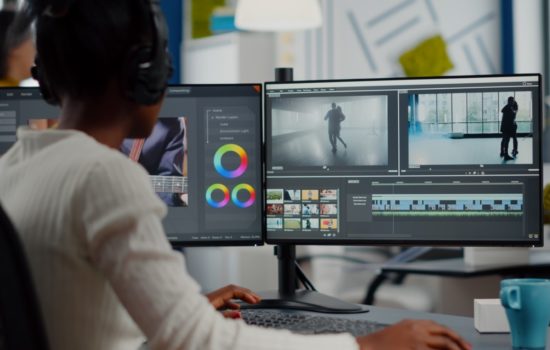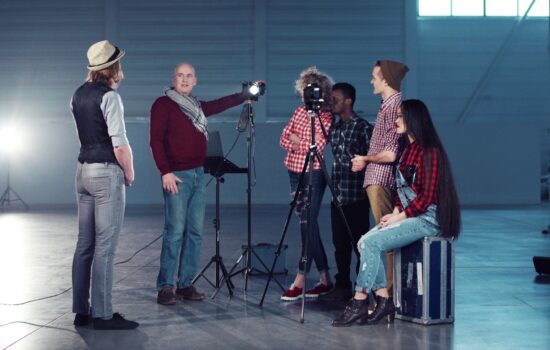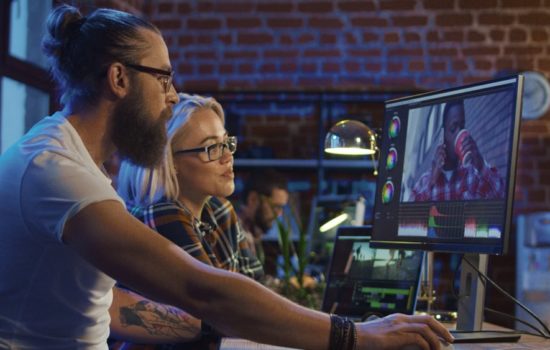Film Editor
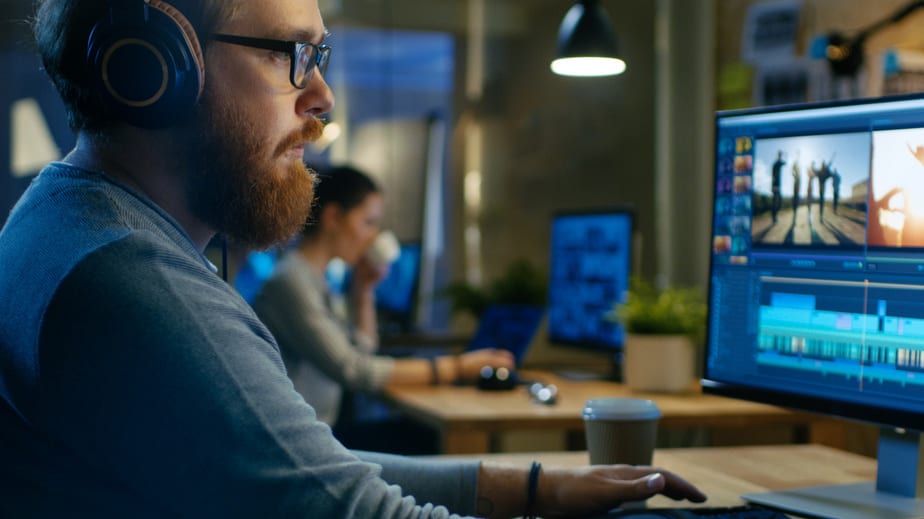
How To Become a Film Editor
People also ask
- What does a Film Editor do?
- What is a Film Editor salary?
- What qualifications do I need to be a Film Editor?
- How does an editor balance maintaining the director's vision while also bringing their own creative input to the editing process?
- How does an editor handle tight deadlines and high-pressure situations?
- What software and tools does an editor primarily use?
Career Description
“The job of a Film Editor (also known as Picture Editor) is to figure out how to tell a story using a bunch of video footage. Sometimes it’s a commercial, sometimes it’s branded content, sometimes it’s a feature film. There’s never really a typical day as an Editor regarding content, unless it’s a long job,” says bicoastal Film Editor Daniel McDonald.
Editors generally work for eight to 10 hours a day – often with the regular input of the Director – when cutting a project. They help craft the story before it’s sent off to a Colorist or Post Sound Team.
The actual process of editing involves spending time with the footage shot in principal photography and determining what the story will be. Though that story is initially told in the script, and again during the production phase, the Film Editor has significant say over what the final narrative is.
The Editor offers a fresh pair of eyes able to refine the cinematic grammar of a film. They shape character and perspective in the storytelling to convey a new meaning from each shot. To do this work, it’s important for all of the footage to be organized and constantly reviewed.
Here’s a quick breakdown of the editing process:
- All of the footage is imported.
- The media is transcoded into a workable codec.
- Shots are organized by scenes and takes.
- All footage is viewed at least once.
- An assembly cut is created.
- A rough cut is put together.
- The fine cut is tweaked.
- Picture lock is set.
For stages five through seven, notes are given on the project by Producers, the Director, and other trustworthy people. This can result in major changes for the film. The more organized a project’s media is, the faster they’ll be able to implement the adjustments.
When a project reaches its final stages, much of the Editor’s job is to think about taking out cuts and making sure the flow of the film is correct before picture lock. Any changes after picture lock are called conforms and are expensive. After picture lock, the Editor might attend to other parts of the post-production process, but it’s usually as a consultant to the Director.
Salary
The average annual salary for Film Editors is approximately $52,100. The salary range for Film Editors runs from $35,000 to $79,000.
Freelance Editors must set their own day rate based on their level of expertise and the budget of the production seeking to hire them. Professionals who are members of the Editors Guild, also known as IATSE Local 700, work for scale or above as established by the union. Rates may vary from project-to-project.
What is a Film Editor salary?
A Film Editor working on a feature film can be paid anywhere in the range of $50,000 give or take. That figure is just a general estimate, though, that can fluctuate based on a number of factors. Those factors include whether the film is a studio-backed project and the experience of the Film Editor. A Film Editor working on a smaller project such as a short film or indie film will likely be paid less.
Hey, what do you think about trying our new Film Career HelperFilm Career Helper really quick? It’s totally free and could help get your career moving fast! Give it a try. It’s totally free and you have nothing to lose.
Career Outlook
Editors typically work freelance but some are employed by post-production facilities. Each job is different, which means that some will have your average 9am to 6pm weekday schedule, whereas others may demand longer days and weekend work depending on the turnaround for it.
“If they’re ambitious, in the evenings they’ll take on another project to work on for a couple of hours. However, it’s easy to get burned out, not only mentally, but also physically. An Editor can hurt their eyes from staring at a screen for too long,” notes McDonald.
He adds, “They can damage their back due to sitting down for an extended period. Carpal tunnel syndrome will set into the wrist if it’s in the wrong position for too long. Overall, it’s important for each Editor to find their own work balance and pace themselves.”
The relationships that a Film Editor has with the Director, Producers, or other individuals giving notes will vary from one gig to the next. Some Directors want to be in the editing room with the Editor. Others allow greater independence and check in only periodically. Producers and Executives may give notes via only email. No two jobs will likely be the same. Film Editors also work with Graphic Designers, Visual Effects Artists, the Post Sound Team, and Composers.
If the budget is big enough, an Assistant Editor is hired to help clean up the timeline and handle exports. On many nights it’s just an Editor alone in a dark room toiling away. Of course, every project is different and has its own needs.
What does a Film Editor do?
A Film Editor is responsible for how the different shots and scenes in a movie come together to tell a story. Usually with input from the Director and Producers, the Film Editor decides which takes to use, the length of those takes, and the order in which the takes are assembled. They also oversee how the images they cut together align with other cinematic elements such as special effects, dialogue, and the score.
How does an editor balance maintaining the director's vision while also bringing their own creative input to the editing process?
The creative collaboration between an editor and director is where many movies come to life. For an editor, managing that balance can sometimes be a highwire act. Here are some tips on how to tow that line…
- Understand The Director’s Creative Intent
- Be Collaborative
- Listen to Feedback
- Create a Rapport and Trust
Once an editor has thoroughly read the script, it’s best to meet with the director and talk through their ideas on how the project should be executed. The editor should walk away from these creative collaborations with a clear understanding of the director’s tone, intent, and overall vision of the film.
Like so many creative mediums, film is a collaborative effort. Even though the director has the final creative say, it’s well within the editor’s responsibilities to provide alternative ideas and differing approaches to the way material should be cut.
It’s important for editors to understand that changes are always going to be made. Sometimes, holding onto an artistic choice can actually be detrimental to the overall health of a project. Listening to feedback and incorporating changes as they’re needed is often an intrinsic part of the process.
A creative collaboration works best in a safe-space flow of ideas. This can only occur when the editor and director trust one another enough to find the right working creative balance between them.
Career Path
“Advancement within the Editor’s career field is frankly just becoming a better Editor. There’s a correlation between the paycheck and proficiency of the artist. There’s always a negotiation over rates and that takes experience to get good at because Producers will always try to hire for as cheap as possible. If the Editor is talented, they can walk away from the deal and find another job. Great Editors are always in high demand,” says McDonald.
At the start of an Editor’s career, the daily rate can be minimal, usually around $100 per day. That rate will increase, though, as that professional builds both experience and their network. With more connections, an Editor may receive more gig offers, which can allow them to negotiate more successfully for higher rates.
Some people may begin as an Assistant Editor or Production Assistant in the editing department of a post house or studio production, which is a good way to shadow more experienced professionals and observe their skillsets. But it never hurts to take on additional jobs if time, energy, and financial resources allow.
“One of the keys to growing as an Editor is working on lots of projects. Growing a network of employers and referrals provides job security and career advancement,” says McDonald.
In the beginning, it can be challenging to find jobs. That being said, with even a minimal amount of work under one’s belt comes more opportunities to develop and maintain professional relationships. An aspiring Editor can also do internships or free gigs. These are likewise good ways to get real-world experience and expand contacts.
During this time, it’s important to follow the advice below to further your career as quickly as possible:
- Make a website, make a website, make a website. (A simple one is okay.)
- Build a portfolio or demo reel of past work.
- Network with Directors, Producers, and fellow Editors.
- Do an internship with a post-production facility.
- Practice making movies. There is lots of stock footage online to download.
How does an editor handle tight deadlines and high-pressure situations?
Film productions can often be pressure-cookers. Everyone seems to be racing against the clock. This is no more apparent than in the editing room, where deadlines always seem to be looming. Here are some ways to deal with those tight timelines…
- Set Personal Deadlines and Checkpoints
- Express Progress Early and Often
- Work On The Important Scenes First
- Sharpen Time Management
Editors can set their own project milestones to be accomplished. This enables them to work at their own pace all the while fulfilling the required needs of the production schedule.
It’s vital that the relevant production team be kept abreast of the post-production schedule and progress. Keeping the proper teams aware of progress allows transparency and also gives time to the producers to adjust the schedule, if necessary.
Every film has their own set of scenes which take priority over others. It behooves an editor to tackle those first and get the feedback they need to move forward in the editing process. If there is an issue with those scenes, starting early on them can give production a chance to help solve the issue, whether that’s through reshoots or other means of rectifying the issue.
This is a skill every department could benefit from enhancing, but applies especially to the editor and their staff. The more an editor can meet milestones (and raise a flag when they can’t), the more efficiently their department, and (on a larger scale) the production, will run.
Experience & Skills
Obviously, filmmaking and editing skills are essential for this career. “My first experiences making films were some of the happiest memories of my life,” McDonald says. “My buddies and I would skate around town, get chased by cops and film all the nonsense we could. There were no grades, no teachers, and no clients to yell at us.”
He adds, “So when I got to film school I didn’t need to learn the software because I already had a lot of hours under my belt. I think that experience served as an important foundation — not just technically, but also kind of emotionally. Even on the worst projects, with the most difficult clients, deep down I know filmmaking is a lot of fun.”
His response demonstrates an attitude that is conducive to success. It’s important to learn the software, but what helps triumph over adversity is a passion to create. If people have the passion and initiative to make their own stories when it comes time to help shape someone else’s vision they can be a better asset.
“The people most likely to succeed at editing understand that it is a craft. They need to be the kind of person who can work every day improving their skill set. It’s the only way to be able to keep up with the competition,” McDonald notes.
That isn’t the only quality a person needs for success, though. Editors are constantly working with clients so interpersonal skills are crucial. Learning how to handle difficult situations, like convincing Producers and Directors to try new ideas, can be difficult. They’ve lived with a project for so long that often they can’t see the film in any other way.
The Editor should not overstep their bounds, but having the ability to eloquently and respectfully convey their thoughts – especially when they differ from those of the Director or Producers – can serve them well in convincing others to trust them as they create a better-told story.
What qualifications do I need to be a Film Editor?
A successful Film Editor comes with a multitude of skillsets. For one, they must have comprehensive knowledge of the editing software platform they are using to cut and assemble the film footage. Two, they must have a creative understanding of how the different shots and scenes should come together to tell a compelling story. Three, a Film Editor must be able to collaborate closely with the Director, Producers, and other individuals who likely will be providing notes on how they want the film to come together.
What software and tools does an editor primarily use?
Very few movies are cut on film these days and working digitally has become the fastest and easiest way to edit movies. But in today’s digitally-led market, there are so many editing tools, it’s easy to get overwhelmed and lost in the mass. Let’s take a look at a few of the most popular…
- Adobe Premiere Pro
- Da Vince Resolve
- Final Cut Pro
- Clipchamp
- Adobe Premiere Rush
Adobe Premiere Pro is a professional suite of editing tools. It’s one of the most powerful video editors in the market, incorporating AI-powered tools like audio enhancement, text-based editing, and color match. Further, it integrates easily with Adobe’s other apps.
A free, cross-platform editing tool, DaVince Resolve offers two different workflows for editing. For editors looking for more features to work with, it offers a wide range of visual effects, audio mastering, and coloring tools.
Although Final Cut Pro can be considered a bit on the pricey side, it offers professional-level editing options that are highly optimized for Apple hardware.
Clipchamp provides the ability to make web-based edits from just about anywhere. It offers very fast performance and has an interface that’s simple and easy to use. Clipchamp also carries templates, stock footage, and bonus content.
Adobe Premiere Rush is a fast, effective tool that allows editors to cut clips together almost instantly and make edits and adjustments in a simple timeline. It also allows the user the ability to share their content to the platform of their choosing.
Education & Training
“One of the best assets for an Editor is YouTube. It has the answer to all of the technical problems involving software. There’s usually some twelve-year-old on the internet who has made a tutorial video that walks through the issue. With the accessibility of digital cameras, it isn’t difficult to get practical experience with the software,” says McDonald.
However, learning how to tell a story is a refined skill that takes time to develop. Many people will take writing courses and enroll in film school to hone their storytelling skills. If people have access to the internet, they can solve most of the technical problems involved with editing but telling a good story requires practice.
Additional Resources
In addition to using YouTube for technical assistance, this platform offers other useful educational and professional advice. On it are video essays that break down popular and classic cinema and teach shot progression and sound elements. The more an Editor knows about what the intention of a shot was, the easier it is for them to either use it correctly or redefine it.
Film Editors who are part of IATSE Local 700 can typically find educational and networking opportunities as well. Aspiring professionals who are not yet union members can still reference the site for general information and look into other online forums such as those found on Facebook and Instagram for networking and educational help.
FAQ
What is the single biggest suggestion you would give to someone wanting to get into this career?
“The biggest action an Editor can take to propel their career forward is to make a website. If there isn’t a place where potential clients can view the Editor’s past work, then it’s difficult for them to evaluate the Editor’s potential. It has become a required asset.
“Directors and Producers would rather watch work than read a resume. Some Editors send links to past work when trying to book a job but that comes off as amateur. Things look a lot better on a website.”
What’s the #1 mistake people make when trying to get into this career?
“The biggest mistake beginners suffer from is looking for instant gratification. By understanding that becoming a successful Editor is a long process, there will be less pressure to succeed. It’s important for an aspiring Editor to hone their craft instead of judging their careers. The better Editors can become, the faster success will find them.”
What is the question people should ask about this career but rarely do?
“Why is organization important for an Editor?
“Producers and Directors never ask why organization is important, let alone budget time for it. If the Editor isn’t allowed to organize assets because the bosses are pushing for results that can cause issues further down the line. Footage can get lost and additional assets like fonts and graphic work will be difficult to find in hard drives. Simple tasks that should literally take less than ten minutes will require an entire day of searching for a specific asset.
“Notes will take longer to turnaround because time will be spent rewatching footage. Also, a lack of organization makes it impossible for multiple Editors to work together on one project. It’s a danger that is easy to get out-of-hand without constant maintenance. The best way an Editor can organize is to create a simple and consistent structure for the project’s folders, then stick to it. Organization is the foundation that lets an Editor work quickly and follow their creative impulses.”
What is one thing I should have asked which I didn’t?
“What’s it like working with different Producers and Directors?
“One of the biggest challenges of being an Editor is working with the different client personalities. Some people are a pleasure to work with — they are very collaborative — but others are aggressive and stubborn. They give commands on exactly what they want done, even though it’s not always the best thing to do.
“It’s the Editor’s job to politely show alternatives and explain the technical aspects of the editing process without getting too much into the technical mumbo-jumbo. At the end of the day, the Editor is there to work with the client, which can sometimes be harder than cutting the film.”
If you could describe in one word what makes you successful, what would it be?
“Passionate.”
Sources
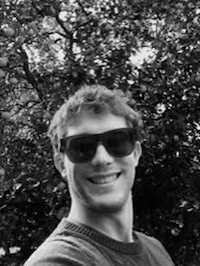
Daniel McDonald
Daniel McDonald is a Film Editor, Producer, and Filmmaker. He holds a degree in English from Lafayette College and an MFA in Film Editing from Chapman University.
He has worked with Awesomeness TV, Nice Studios, PopSugar, DreamworksTV, Whalerock, Beats by Dre, Zambezi, Directors Guild of America, History Channel, and with Directors Randal Kleiser (Grease), Penelope Spheeris (Wayne’s World) and Aron Gaudet & Gita Pullapilly (Beneath The Harvest Sky). He’s based in Los Angeles and New York.
References
- 1. "Film Editor Salaries". Glassdoor. published: 24 January 2020. retrieved on: 8 April 2020
